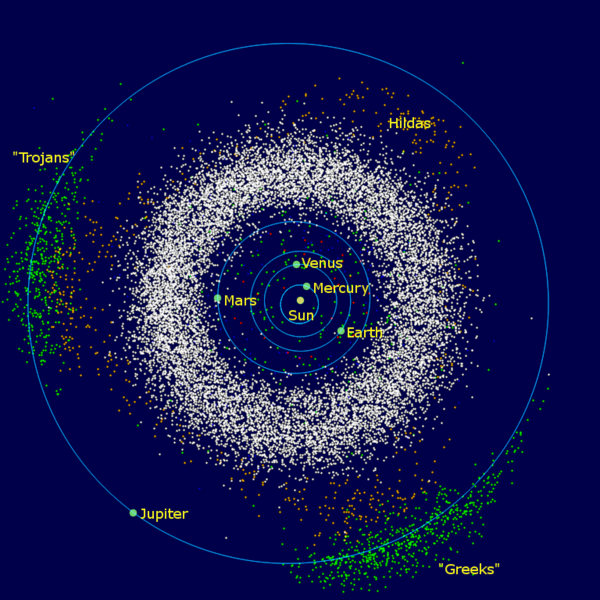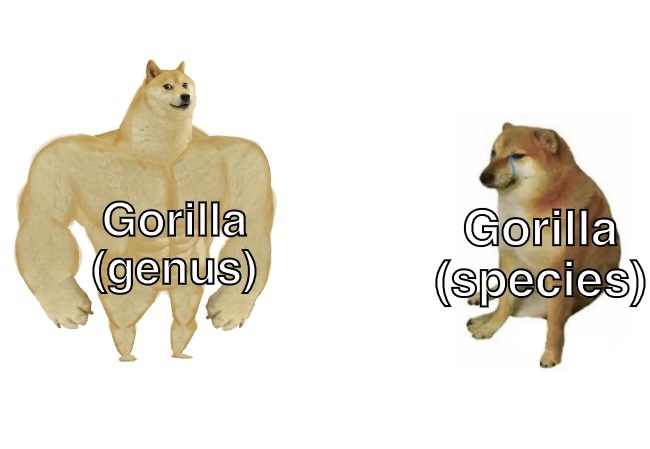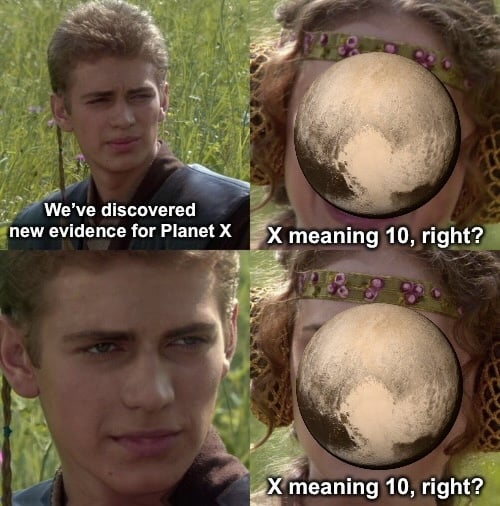Pluto will always be a planet to me, and you'll pry that definition from my cold, dead hands!
Science Memes
Welcome to c/science_memes @ Mander.xyz!
A place for majestic STEMLORD peacocking, as well as memes about the realities of working in a lab.

Rules
- Don't throw mud. Behave like an intellectual and remember the human.
- Keep it rooted (on topic).
- No spam.
- Infographics welcome, get schooled.
This is a science community. We use the Dawkins definition of meme.
Research Committee
Other Mander Communities
Science and Research
Biology and Life Sciences
- !abiogenesis@mander.xyz
- !animal-behavior@mander.xyz
- !anthropology@mander.xyz
- !arachnology@mander.xyz
- !balconygardening@slrpnk.net
- !biodiversity@mander.xyz
- !biology@mander.xyz
- !biophysics@mander.xyz
- !botany@mander.xyz
- !ecology@mander.xyz
- !entomology@mander.xyz
- !fermentation@mander.xyz
- !herpetology@mander.xyz
- !houseplants@mander.xyz
- !medicine@mander.xyz
- !microscopy@mander.xyz
- !mycology@mander.xyz
- !nudibranchs@mander.xyz
- !nutrition@mander.xyz
- !palaeoecology@mander.xyz
- !palaeontology@mander.xyz
- !photosynthesis@mander.xyz
- !plantid@mander.xyz
- !plants@mander.xyz
- !reptiles and amphibians@mander.xyz
Physical Sciences
- !astronomy@mander.xyz
- !chemistry@mander.xyz
- !earthscience@mander.xyz
- !geography@mander.xyz
- !geospatial@mander.xyz
- !nuclear@mander.xyz
- !physics@mander.xyz
- !quantum-computing@mander.xyz
- !spectroscopy@mander.xyz
Humanities and Social Sciences
Practical and Applied Sciences
- !exercise-and sports-science@mander.xyz
- !gardening@mander.xyz
- !self sufficiency@mander.xyz
- !soilscience@slrpnk.net
- !terrariums@mander.xyz
- !timelapse@mander.xyz
Memes
Miscellaneous
Stay strong. A dwarf planet is a perfectly valid kind of planet, don't let anyone tell you otherwise.
It's not the size that counts but the ability to clear your orbit. ;)
So tell me about Jupiter
Good question! I had forgotten about Jupiter's Trojans and Greek asteroids!

I went and checked the definiton of Clearing the Neighborhood by IAU, emphasis mine:
The phrase refers to an orbiting body (a planet or protoplanet) "sweeping out" its orbital region over time, by gravitationally interacting with smaller bodies nearby. Over many orbital cycles, a large body will tend to cause small bodies either to accrete with it, or to be disturbed to another orbit, or to be captured either as a satellite or into a resonant orbit. As a consequence it does not then share its orbital region with other bodies of significant size, except for its own satellites, or other bodies governed by its own gravitational influence. This latter restriction excludes objects whose orbits may cross but that will never collide with each other due to orbital resonance, such as Jupiter and its trojans, Earth and 3753 Cruithne, or Neptune and the plutinos.[3] As to the extent of orbit clearing required, Jean-Luc Margot emphasises "a planet can never completely clear its orbital zone, because gravitational and radiative forces continually perturb the orbits of asteroids and comets into planet-crossing orbits" and states that the IAU did not intend the impossible standard of impeccable orbit clearing.[2]
Trojans and Greeks orbit Jupiter's LaGrange points in a stable orbit and so they are governed by Jupiter's gravity. You could say they're really weird moons orbiting semi-stable points Jupiter creates.
Does it dig mines and sing upbeat work songs?
ROCK AND STONE…….. and orbits
Arenyou gonna start calling Ceres, Haumea, Makemake, and Orcus planets?
We went through this 150 years ago ehen the asteroid belt was discovered. Every astronomer wanted credit for discovering a new planet, so at one point there were 15 before all the astronomers got together and said it was untenable.
Yes. We could have had a planet Orcus and we were like "nah, we'll pass." That would have been metal as shit.
Whatever, Pluto is a dwarf planet like every other dwarf planet too.
You know, this post made me realize something. Some people are viewing it in terms of "rank", instead of an arbitrary scientific classification designed to efficiently communicate ideas in a clear and concise way.
It's like ... mythology or something, and the planet(oid) being anthropomorphized.
Do people also view kingdom, phylum, class, order, family, genus, species as "ranks" of some sort, with some intrinsically greater value being given to some over others?
It’s like … mythology or something, and the planet(oid) being anthropomorphized.
I mean, the planet(oid)s are named after gods.
The personification of its classification is probably related to the exclusivity of the title and “bigger is better” mentality. Since every life form has a taxonomy for domain to species, there’s not really an exclusivity to each echelon. I don’t imagine anybody really thinks like this meme below, for example:

This makes me want to devise a tiered, inclusive classification scheme for space objects.
We could start with orbital objects, any object that normally experiences regular, periodic orbits with minimal deviation. So, everything in the galaxy would be one except potentially Sag A, and the galaxy itself. Perhaps the next branching subsets could be things undergoing continuous fusion somewhere in their body or not?
Do people also view kingdom, phylum, class, order, family, genus, species as "ranks" of some sort, with some intrinsically greater value being given to some over others?
Well, for humans we most certainly do
So, "homo" is better than "sapiens"? And "animal" is better than homo sapiens?
Or do I have it backwards, and "lower" ranks are better? So, "pinus ponderosa" would be better than "plant"?
I think it'll matter a bit more once (if) we get to explore our solar system for real. I feel like right now the concept of "planet" is still rather distant in our minds and a lot of people just base it on vibes
Damnit who let Elon name that planet?
When ever Eris isn't on screen everyone should be asking "Where's Eris?"
"Where is Eris? Is it safe? Is it all right?"
"It appears that, in your anger... You classified it as a dwarf planet."
"NOOOOOOOOOOOOOOOO!"
Hmmm… Lost a planet Obi-Wan has. How embarrassing.
Our Ceres is perfectly legal
aint no planet x coming cause aint no space cuz aint not globe earth
Cease your investigation!
Imagine how poor Pluto would feel if we decided this new entry counted as a proper planet.
Nah, man. Pluto doesn’t care any more. Even as a dwarf planet, he knows he’s still hot shit
Pluto is the celestial body your Wife tells you not to worry about because “Oh, don’t worry it’s just Pluto coming over when you are out of town, and Pluto isn’t a planet so there is nothing for you to get anxious or jealous about”.
It'd have to be exceptionally large to clear its orbital path at that distance from the sun. It'll probably join Pluto in the dwarf planet category.
He should pull himself up by his bootstraps and get his Alpha Planet grindset on. No one can be a proper planet with this Sigma Planet mindset
Is planet X really discovered?
They found more evidence for its existence recently, but no. Nobody has ever seen it or even found out in which direction to look. The evidence is that the other planets move in ways that only makes sense if there is some mass somewhere pulling their orbits.
Sort of like having to discover the moon from watching the tides in the sea.
Thought there were some significant progress..
Well we figured out where to look for it, and it is definitely the sky. We tried looking the last place we left it, and then we looked all around the basement from top to bottom. Yup, we can say with confidence folks, Planet X is hiding somewhere above us.
Yeah well, not really. Next year maybe, according to the article linked yesterday.
I saw it named planet 9
Named so here https://en.m.wikipedia.org/wiki/Planet_Nine
~~Ceres~~ and Eris didn’t even get turns being planets
Ceres was considered a planet in the first half of the 1800's, along with a bunch of things in the asteroid belt. There was a point where there were 64 planets.
In the present state of knowledge astronomers give us the following list:
Sixty-four "primary planets" revolving round the Sun as our Earth does.
Twenty satellites, including our Moon.
Of the sixty-four primary planets fifty-six are asteroids, comparatively small bodies, all of which were discovered in this century, and fifty-two since the year 1844.]
